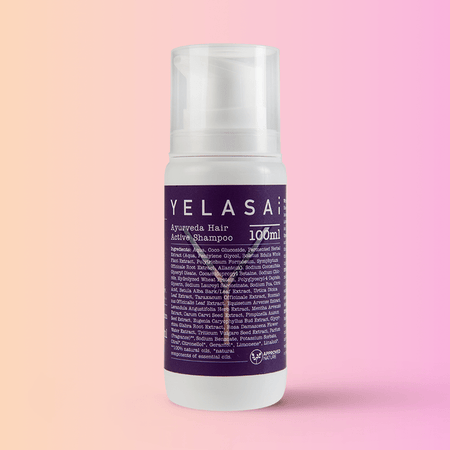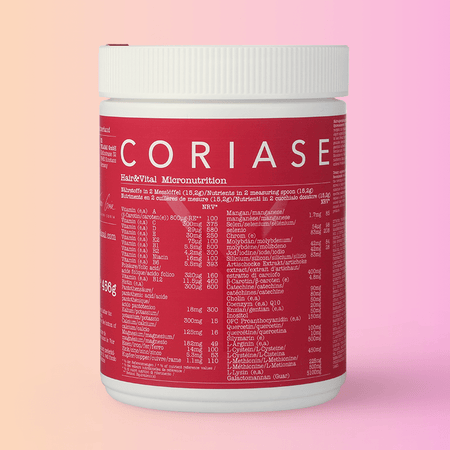Diffuse hair loss: symptoms, causes & treatment
With diffuse hair loss, the hair on the entire head becomes thinner. If those affected previously had thick hair, their scalp suddenly shimmers through in some areas. Diffuse hair loss occurs in both women and men and can have a variety of causes.
In this article we will explain to you how diffuse hair loss can occur, how you can recognize this form of hair loss and how it is diagnosed. At the same time, we will summarize for you how diffuse hair loss can be treated and how YELASAI hair care products can support you.
What is diffuse hair loss?
Find out here what diffuse hair loss means and how it manifests itself in men and women.
Learn moreWhat triggers and causes for diffuse hair loss are there?
Find out more about how diffuse hair loss occurs and what causes it can have.
Learn moreHow is the diagnosis of diffuse hair loss carried out?
Find out what diagnostic options there are for diffuse hair loss and what the tests look like exactly.
Learn moreHow do YELASAI products support you with diffuse hair loss?
Find out what you can do if you have diffuse hair loss and what effect YELASAI products can have.
Learn moreWhat is diffuse hair loss?
Diffuse hair loss is also known as alopecia diffusa, diffuse alopecia or effluvium diffusum. With this form of hair loss, there is no specific pattern that applies to everyone affected.
Rather, the hair loss is distributed over the entire head. The hair becomes thinner overall and occasional thin spots may appear. In some of those affected, the scalp shines through.
As a rule, healthy people lose up to 100 hairs per day. If you lose significantly more hair per day over several weeks, you could be suffering from pathological hair loss. With diffuse hair loss, several hundred hairs can fall out per day.
It is differentiated into two different forms:
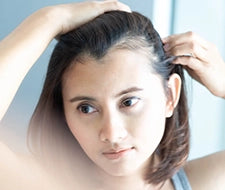
Telogen Effluvium
The hair begins to fall out prematurely and no longer grows long enough. This often occurs three to four months after the triggering event. This type of diffuse hair loss is much more common.
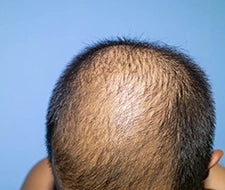
Anagen effluvium
This is an acute hair loss. The hair falls out during the growth phase. As a result, those affected often lose a lot of hair in a short period of time.
In which phases does head hair grow?
The two forms of diffuse hair loss differ in which phase of hair growth they fall out. To explain this more easily, we will first show you the phases in which your hair grows:

Anagen phase
This is the growth phase. It lasts about two to eight years, with between 80 and 90 percent of all hair growing.

Catagen phase
This transition phase lasts about two weeks. The hair stops growing while the hair roots and papillae shrink.
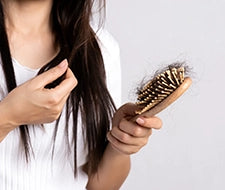
Telogen phase
This is followed by the rest and down phase. The hair falls out over a period of around two to four months.
Whether telogen or anagen effluvium is present depends on the phase in which the hair falls out.
With telogen effluvium, hair falls out more during the shedding phase. However, the situation is different with anagen effluvium, the acute form of hair loss. The hair falls out in the anagen phase, i.e. the growth phase. This is why hair falls out very quickly with this form.
What are the symptoms of diffuse hair loss in women?
Diffuse hair loss in women can be difficult to detect. Especially with long hair, it is not easy to judge whether the number of hairs falling out exceeds 100 or not. A few long hairs in the brush can look like a lot.
Many affected women report that suddenly and for no apparent reason, significantly more hair falls out than before. Within a few weeks the scalp shines through and the symptoms become clearly noticeable. Diffuse hair loss in women is usually reversible.
This means that hair growth can return to normal once the cause of diffuse hair loss has been identified and corrected. If you look at the diffuse hair loss before and after, in many cases you can see that the hair grows back significantly denser than before.
Frequency of diffuse hair loss in women
Studies show that diffuse hair loss occurs significantly more frequently in women than in men. This is partly because women are more often affected by the causes that cause diffuse hair loss. This is why women are 10 times more likely to suffer from diffuse hair loss.

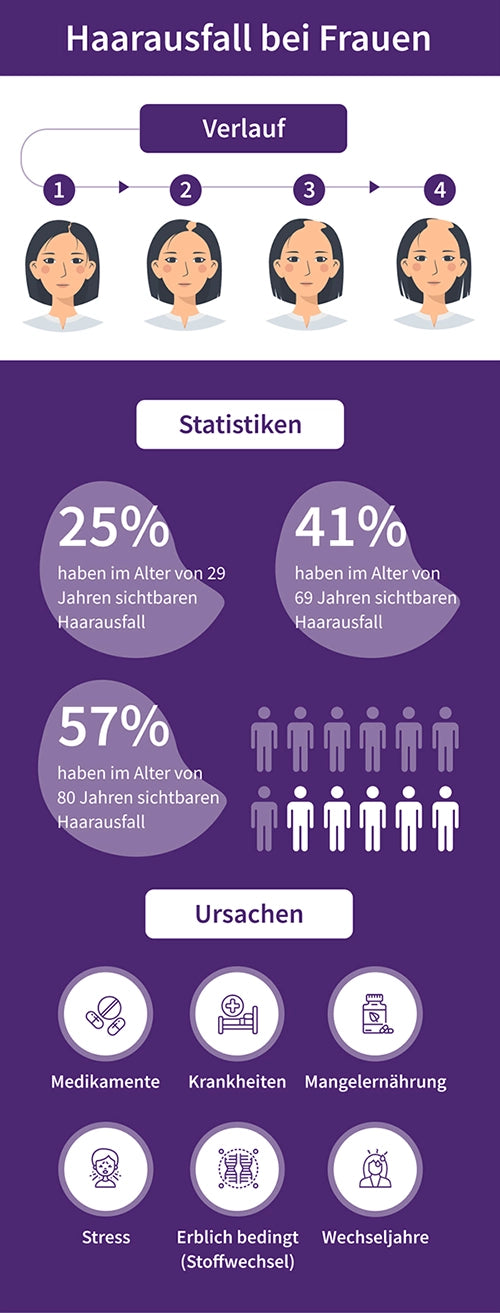
How does diffuse hair loss occur in men?
The symptoms of diffuse hair loss are similar in men and women. Suddenly there is severe hair loss. A receding hairline appears and the scalp shines through. Nevertheless, diffuse hair loss in women and men does not follow a common pattern.
In men, this form of hair loss does not result in complete hair loss and is reversible. If the cause is eliminated, the hair will start to grow again. In men, diffuse hair loss can also lead to a change in the hair structure before and after.

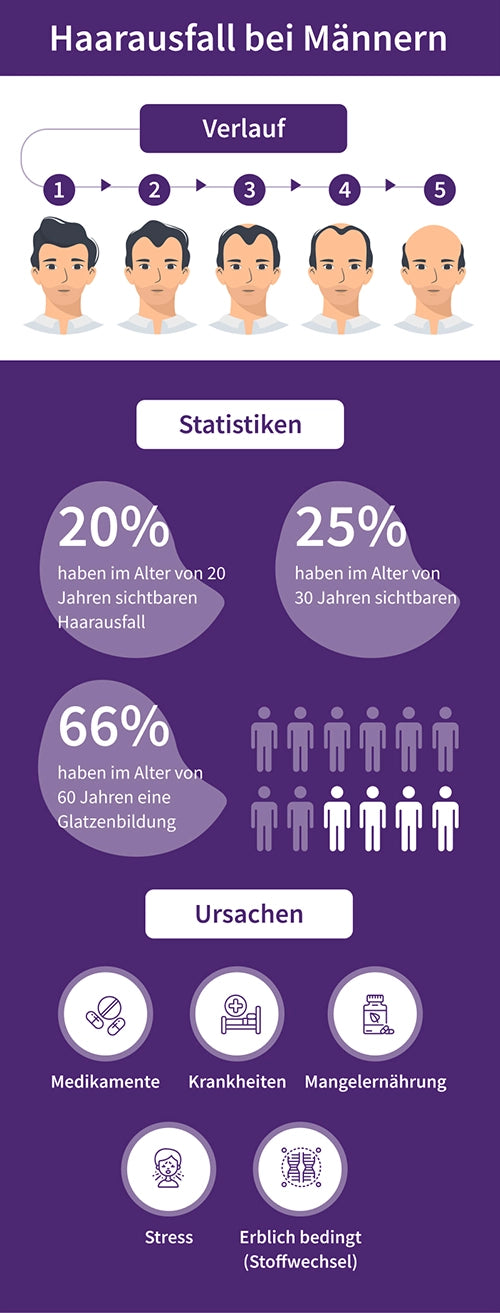
What triggers and causes for diffuse hair loss are there?
If you notice that you are losing more and more hair, then you should identify the cause of the hair loss. Diffuse hair loss can have a wide variety of triggers that need to be recognized and eliminated. You can consult a hair growth specialist and if you think an illness could be the cause, consult a doctor.
We summarize the most common causes of diffuse hair loss in women and men for you:
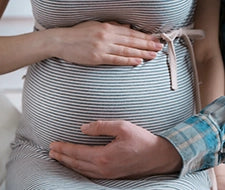
Hormonal fluctuations
Women in particular are subject to strong hormonal fluctuations in their lives. These include puberty, pregnancy, stopping the pill or menopause. They can all lead to diffuse hair loss. An underactive or overactive thyroid can also promote diffuse hair loss.

Nutrient and vitamin deficiency
The cause of hair loss can also be a lack of nourishment. For example, pregnant women, athletes, people with an eating disorder or vegetarians or vegans are at risk. Iron deficiency is particularly widespread.

Poisonings
Poisoning with heavy metals can cause diffuse hair loss. Even if these cases are quite rare, you should be aware of the danger. Mercury and cadmium, for example, are particularly dangerous.

Side effect of medication
If you take a new medication, hair loss could be a side effect. Because your hair doesn't fall out until two to three months later, a diagnosis can sometimes be difficult. Triggers can include taking blood thinners, antidepressants or antiepileptic drugs.

chemotherapy
Chemotherapy or radiation slows cell growth. This also affects the hair because it inhibits the growth phase.

Stress
Stressful phases can also lead to diffuse hair loss. The exact cause of this is not yet known - however, research sees a connection between inflammatory substances that are released during stress and hair loss.
It may take some time before the cause of the hair loss can be found. This is mainly because there can be so many different triggers: some of them are obvious, others not.
If you suffer from diffuse hair loss and you are looking for the cause in an illness, then you should first consult a doctor. This can identify and treat some reasons such as an underactive thyroid, nutrient deficiencies or other hormonal problems. On our blog you can find out more about possible causes of hair loss and how it can be treated.
How is diffuse hair loss diagnosed?
There are various tests that can usually be used to detect diffuse hair loss. This includes a plucking test in which a doctor pulls a strand of hair with around ten hairs. If more than three to four hairs fall out, then this is an indication of excessive hair loss.
A similar test for diagnosing hair loss in women and men is the trichogram. 50 to 100 hairs are plucked out and examined under a microscope. Blood tests and a urine sample are also common ways to diagnose diffuse hair loss.
Do I need a firm diagnosis from a doctor?
If an illness is the cause of diffuse hair loss, the illness should be treated by a doctor. In the event of deficiency symptoms, high-dose nutritional supplements can be taken after consultation with a doctor. As a side effect of medication, an alternative can be sought. If you are ill, you should seek medical advice.
How can YELASAI hair care products help treat diffuse hair loss?
Diffuse hair loss is a major burden for those affected. Once you have spoken to your doctor and found out the cause, you can use YELASAI hair care products as additional support.
Our high-quality products are based on natural ingredients and are intended to care for the hair and scalp. This stimulates hair growth and your hair can become fuller and have more volume again.
For daily care, you can use our Ayurveda Hair Active Shampoo , which gently cleanses the hair and scalp. In combination with the study-proven Ayurveda Hair Active Tonic , which reactivates the hair roots and hair cells, the first results can be seen within a few weeks and months.
To strengthen your hair from the inside, you can also use our Hair Active Caps if you have diffuse hair loss. They provide you with zinc, biotin, selenium and me plant substances. These nutrients can help maintain normal hair.
If you are unsure, please feel free to contact the YELASAI hair growth specialists in your area . Professional care advice awaits you there, including specific product recommendations for your scalp care and hair situation.
Our conclusion: Support your hair with natural care products
If you have diffuse hair loss, it is particularly important to care for your scalp intensively. YELASAI hair care products support the scalp's natural processes and thus promote hair growth.
Our products specially developed for hair growth can stimulate hair growth even if hair loss is not caused by illness. This gives your hair a healthy look again as well as more volume and fullness.
We rely on natural ingredients and avoid synthetic ingredients and silicones so that your hair and scalp can recover optimally. Feel free to visit our online shop and find the right hair care products for your individual hair situation.







